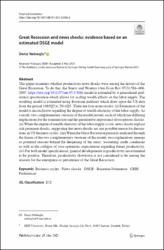Please use this identifier to cite or link to this item:
https://hdl.handle.net/20.500.11779/1504Full metadata record
| DC Field | Value | Language |
|---|---|---|
| dc.contributor.author | Nebioğlu, Deniz | - |
| dc.date.accessioned | 2021-06-19T13:30:04Z | |
| dc.date.available | 2021-06-19T13:30:04Z | |
| dc.date.issued | 2021 | - |
| dc.identifier.citation | Nebioğlu, D. (2021). Great Recession and news shocks: evidence based on an estimated DSGE model. Empirical Economics. p. 1-37. https://doi.org/10.1007/s00181-021-02068-6 | en_US |
| dc.identifier.issn | 0377-7332 | - |
| dc.identifier.issn | 1435-8921 | - |
| dc.identifier.uri | https://hdl.handle.net/20.500.11779/1504 | - |
| dc.identifier.uri | https://doi.org/10.1007/s00181-021-02068-6 | - |
| dc.description.abstract | This paper examines whether productivity news shocks were among the drivers of the Great Recession. To do this, the Smets and Wouters (Am Econ Rev 97(3):586–606, 2007. https://doi.org/10.1257/aer.97.3.586) model is extended by a generalized preference specification which allows for scaling wealth effects on the labor supply. The resulting model is estimated using Bayesian methods which draw upon the US data from the period 1965Q2 to 2014Q3. There are four main results: (i) Estimation of the model is inconclusive regarding the degree of wealth elasticity of the labor supply. As a result, two complementary versions of the model prevail, each of which has differing implications for the transmission and the quantitative importance of exogenous shocks. (ii) When the degree of wealth elasticity of the labor supply is low, news shocks replace risk premium shocks, suggesting that news shocks are one possible reason for fluctuations in US business cycles. (iii) When the Great Recession period is analyzed through the lenses of the two complementary versions of the model, two explanations emerge as potential reasons behind the deepening of the crisis: worsening credit conditions as well as the collapse of over-optimistic expectations regarding future productivity. (iv) For both model specifications, general developments in productivity are estimated to be positive. Therefore, productivity slowdown is not considered to be among the reasons for the emergence or persistence of the Great Recession. | en_US |
| dc.language.iso | en | en_US |
| dc.publisher | Springer | en_US |
| dc.rights | info:eu-repo/semantics/openAccess | en_US |
| dc.subject | Dsge | en_US |
| dc.subject | Ghh preferences | en_US |
| dc.subject | Bayesian estimation | en_US |
| dc.subject | Business cycles | en_US |
| dc.subject | News shocks | en_US |
| dc.title | Great Recession and News Shocks: Evidence Based on an Estimated Dsge Model | en_US |
| dc.type | Article | en_US |
| dc.identifier.doi | 10.1007/s00181-021-02068-6 | - |
| dc.identifier.scopus | 2-s2.0-85106438917 | - |
| dc.authorid | Deniz Nebioğlu / 0000-0002-1555-4896 | - |
| dc.description.woscitationindex | Social Science Citation Index | en_US |
| dc.identifier.wosquality | Q2 | - |
| dc.description.WoSDocumentType | Article; Early Access | - |
| dc.description.WoSInternationalCollaboration | Uluslararası işbirliği ile yapılmayan - HAYIR | en_US |
| dc.description.WoSPublishedMonth | May | en_US |
| dc.description.WoSIndexDate | 2021 | en_US |
| dc.description.WoSYOKperiod | YÖK - 2020-21 | en_US |
| dc.identifier.scopusquality | Q2 | - |
| dc.relation.publicationcategory | Makale - Uluslararası Hakemli Dergi - Kurum Öğretim Elemanı | en_US |
| dc.identifier.endpage | 37 | en_US |
| dc.identifier.startpage | 1 | en_US |
| dc.department | İİSBF, Ekonomi Bölümü | en_US |
| dc.relation.journal | Empirical Economics | en_US |
| dc.identifier.wos | WOS:000653000200001 | - |
| dc.institutionauthor | Nebioğlu, Deniz | - |
| item.grantfulltext | open | - |
| item.languageiso639-1 | en | - |
| item.openairetype | Article | - |
| item.cerifentitytype | Publications | - |
| item.fulltext | With Fulltext | - |
| item.openairecristype | http://purl.org/coar/resource_type/c_18cf | - |
| Appears in Collections: | Ekonomi Bölümü Koleksiyonu Scopus İndeksli Yayınlar Koleksiyonu / Scopus Indexed Publications Collection WoS İndeksli Yayınlar Koleksiyonu / WoS Indexed Publications Collection | |
Files in This Item:
| File | Description | Size | Format | |
|---|---|---|---|---|
| Nebioğlu2021_Article_GreatRecessionAndNewsShocksEvi.pdf | Full Text - Article | 2.37 MB | Adobe PDF |  View/Open |
CORE Recommender
Sorry the service is unavailable at the moment. Please try again later.
Items in GCRIS Repository are protected by copyright, with all rights reserved, unless otherwise indicated.